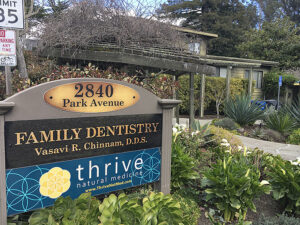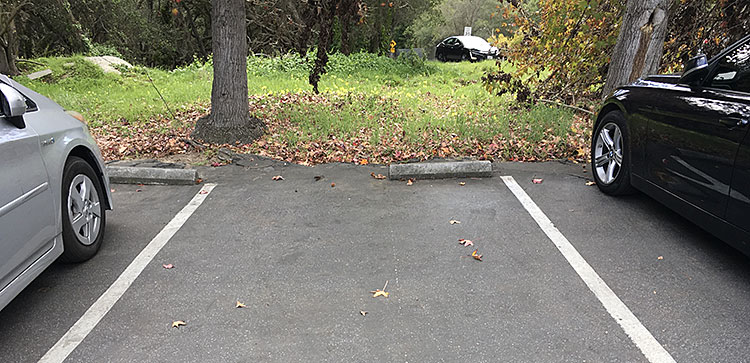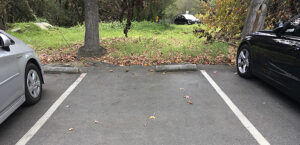By Jondi Gumz
Neighbors are abuzz over a proposal for which Santa Cruz County is seeking up to $13.5 million from the state to build 36 rental units in Soquel to permanently house people who are homeless or at risk of losing their abode.
 There was a community meeting on Feb. 27 in Willowbrook Park.
There was a community meeting on Feb. 27 in Willowbrook Park.
The 1.04-acre site at 28387 Park Ave. is undeveloped, filled with trees and blooming flowers, and .311 riparian acres are protected, leaving .73 acres buildable.
The site is next to Thrive Natural Medicine, the holistic practice of Dr. Irene Valencia and Dr. Carlos Rios, and a dentist, Dr. Vasavi Chinnam, a beautifully landscaped office at 2840 Park Ave., Soquel.
Thrive, however, does not own the medical-dental office building.
The owner is Pajaro Wall Street Inn LLC in Watsonville, which bought the property in 2019 for $1.6 million.
Abdol H. Novin, the owner’s agent, is affiliated with Novin Development of Walnut Creek, which partnered with the county to apply for funding under Project Homekey, a state effort to rapidly expand housing for homeless people.
Novin restored the 70-unit Wall Street Inn and proposed to build 145 affordable rentals at 831 Water St., Santa Cruz, a SB35 project under review.
Project Homekey has $1.45 billion, $1.2 billion from the federal American Rescue Plan Act of 2021 and $250 million in state General Funds. The funds, if granted, must be spent in eight months.
County Communications Manager Jason Hoppin said the county should hear back on funding in March.
County supervisors voted in January to apply for funds with Novin Development and the Central Valley Coalition for Affordable Housing. The development is described as “Permanent Supportive Housing” because residents would receive services on-site.
A lack of detailed information prompted neighbors to share concerns on NextDoor. At Thrive, staff knew Novin owns 2838 Park Ave. and 2840 Park Ave. but did not know if Thrive’s doctors would have to find a new location.
Hoppin provided answers to questions posed by Capitola-Soquel Times.
Asked if the medical office in involved, he said, “It depends. However, that is not part of the Homekey proposal. It could theoretically happen under
AB 140, which preempts local land-use laws. Under current zoning, it would have to be a mixed-use or commercial project but for the Homekey application.”
He said the property owner had submitted several prior proposals for 2838 Park Ave. for a slightly larger, mixed-income rental housing project.
The medical office property provides access to 2838 Park Ave. via its driveway and parking lot.
Hoppin said the Homekey proposal is to house extremely low-income families, veterans and “transition-age youth,” many exiting the foster care system and who would benefit from proximity to Cabrillo College and a major transit route.
Individuals with restrictions on where they can live relative to facilities with children will not be approved as tenants at the site, Hoppin said.
Prospective tenants would be referred by the county’s “Coordinated Entry System” for households experiencing homelessness, Hoppin said, with all applicants undergoing a screening process by the on-site property manager prior to lease.
There would be 32 one-bedroom units, four two-bedroom units, a leasing office, meeting rooms and amenities, he added.
This would add 35 extra-low income units toward the quota mandated by theAssociation of Monterey Bay Area Governments for 2015-2023, which, Hoppin said, “would be major achievement consistent with County, CoC, and State housing policy.”
CoC means Continuum of Care.
Hoppin noted state law requires all rental properties with 16 or more units to have a resident manager on site.
Supportive services would be provided by Abode Services, headquartered in Fremont with a presence in Watsonville since 2012, which has provided services via contracts with the county and Continuum of Care. Recently Abode had a CoC contract to reach out to property owners and property managers with financial incentives to consider homeless tenants.
Other organizations would likely provide support, Hoppin said, citing the Veterans Administration, which has committed VASH vouchers to the project.
A dozen “tuck-under” parking spaces would be in the rear of the building for residents, along with parking on the front and side. The building is to include a meeting room, leasing office, bike parking and laundry room.
This location is is walking distance to Cabrillo and within a quarter-mile of the nearest Metro bus stop on Soquel Drive.
Elderly residents may call for Lift Line, Uber or a cab, Hoppin said. Younger residents would likely bike or walk to school or work.
To neighbors concerned that people addicted to drugs would move in, Hoppin said, “The population of homeless persons is varied and while some struggle with substance use issues, many do not and simply cannot afford the extraordinary housing costs driven by years of insufficient affordable housing production that this project and other Homekey projects seek to begin to remedy.
The development will not be a recovery or halfway house. It will serve as a permanent residence for highly vulnerable individuals and families who are very low-income or at risk of homelessness, or are exiting homelessness. This is just an affordable housing project, similar to many throughout all areas of our community.”
He added, “These same kinds of concerns were raised in connection with the Aptos Blue project… Now that it has been built, it has been a wonderful community asset with few if any issues. Same with St. Stephens (which Novin led) and many others.”
Asked about environmental review and community meeting, Hoppin said AB 2162 (a 2018 law to streamline approval of supportive housing) and Homekey projects “are exempt from CEQA so environmental impact reports are not required. The county’s Development Review Group has reviewed the preliminary project plans and has not identified any technical infeasibilities at this point.”
He added, “A community meeting is not required, but the applicant is planning to begin outreach to the community if the Homekey award is received, and Supervisor Koenig plans one as well. Should the development meet the requirements under 2162 and/or receive Homekey funds, the law is very clear that the project must be approved.”
Hoppin said adjacent tree removal activities are unrelated to 2838 Park Ave.




